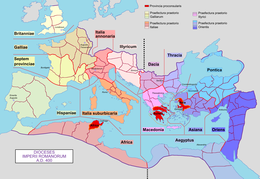Vicarius is a Latin word, meaning substituteordeputy. It is the root of the English word "vicar".


Originally, in ancient Rome, this office was equivalent to the later English "vice-" (as in "deputy"), used as part of the title of various officials. Each vicarius was assigned to a specific superior official, after whom his full title was generally completed by a genitive (e.g. vicarius praetoris). At a low level of society, the slave of a slave, possibly hired out to raise money to buy manumission, was a servus vicarius.[1]
Later, in the 290s, Emperor Diocletian carried out a series of administrative reforms, ushering in the period of the Dominate. These reforms also saw the number of Roman provinces increased, and the creation of a new administrative level, the diocese. The dioceses, initially twelve, grouped several provinces, each with its own governor. The dioceses were headed by a vicarius, or, more properly, by a vices agens praefecti praetorio ("deputy of the praetorian prefect"). An exception was the Diocese of the East, which was headed by a comes ("count"). In 370 or 381, Egypt and Cyrenaica were detached from the Diocese of the East and made a diocese under an official called the Augustal Prefect.
In the eastern parts of the Empire, dominated by the Greek language and common use of Greek terminology, a vicarius was called an exarch.[2]
According to the Notitia dignitatum (an early 5th century imperial chancery document), the vicarius had the rank of vir spectabilis; the staff of a vicarius, his officium, was rather similar to a gubernatorial officium. For example, in the diocese of Hispania, the staff of the vicarius included: